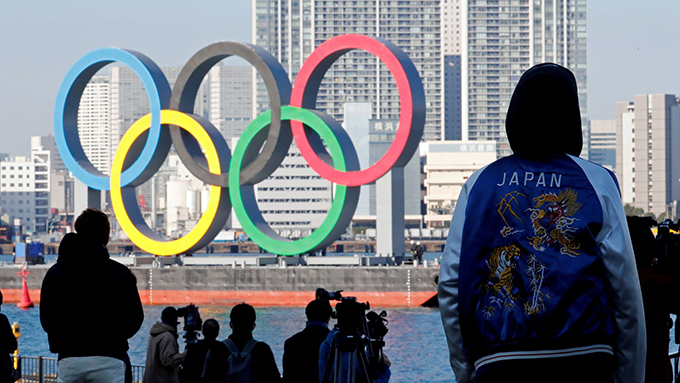 Two weeks before the start of the Tokyo Olympics, a state of emergency has been declared by the Japanese government in its latest attempt to contain the spread of COVID-19. It’s another setback for these Olympics, which have already been postponed for a year and will now go ahead without any spectators.
With concerns that the Tokyo Olympics could become a super-spreader event, why then are the Games even taking place?
The answer lies in the power that the International Olympic Committee – the self-proclaimed “supreme authority” for world sport – holds over the cities and countries that host the Games.
If anyone was unaware of the IOC’s use and abuse of power before 2020, events surrounding the Tokyo Olympics during the COVID-19 pandemic have shed unprecedented light on the organization’s iron grip over host cities and countries.
Since early 2020, IOC president Thomas Bach and fellow veteran IOC members John Coatea (chair of Tokyo Co-ordination Commission, the main liaison between the IOC and Tokyo organizers) and Richard Pound have been the dominant voices of the committee. Their statements on the postponement or potential cancellation of the Tokyo Games reflect denial, hubris and self-congratulatory rhetoric.
The Tokyo Olympics as “the light at the end of the tunnel” has been one of Bach’s favourites platitudes, while boosters’ references to a “post-corona world” illustrate the same unfounded optimism.
On the question of contingency plans in the event Tokyo needed to cancel the Games, Coates flatly stated last year that there was “no Plan B”. Bach spread the same message earlier this year.
Two weeks before the start of the Tokyo Olympics, a state of emergency has been declared by the Japanese government in its latest attempt to contain the spread of COVID-19. It’s another setback for these Olympics, which have already been postponed for a year and will now go ahead without any spectators.
With concerns that the Tokyo Olympics could become a super-spreader event, why then are the Games even taking place?
The answer lies in the power that the International Olympic Committee – the self-proclaimed “supreme authority” for world sport – holds over the cities and countries that host the Games.
If anyone was unaware of the IOC’s use and abuse of power before 2020, events surrounding the Tokyo Olympics during the COVID-19 pandemic have shed unprecedented light on the organization’s iron grip over host cities and countries.
Since early 2020, IOC president Thomas Bach and fellow veteran IOC members John Coatea (chair of Tokyo Co-ordination Commission, the main liaison between the IOC and Tokyo organizers) and Richard Pound have been the dominant voices of the committee. Their statements on the postponement or potential cancellation of the Tokyo Games reflect denial, hubris and self-congratulatory rhetoric.
The Tokyo Olympics as “the light at the end of the tunnel” has been one of Bach’s favourites platitudes, while boosters’ references to a “post-corona world” illustrate the same unfounded optimism.
On the question of contingency plans in the event Tokyo needed to cancel the Games, Coates flatly stated last year that there was “no Plan B”. Bach spread the same message earlier this year.
Free speech?
Criticism from Olympic “insiders” is both rare and noteworthy. In June, Japanese Olympic Committee member Kaori Yamaguchi claimed Tokyo had been “cornered” into proceeding. She was critical of the IOC for appearing “to think it could steamroll over the wishes of the Japanese public,” given that about 80 per cent of people wanted the Games postponed again or cancelled. At the beginning of the pandemic — when the IOC was still suggesting the Tokyo Games would start as scheduled in July 2020 — Hayley Wickenheiser, a member of the IOC Athletes’ Commission, called for postponement. She received a speedy rebuke from an IOC official, stating that it was “a pity” she had posted her thoughts “without asking the IOC first.” “I didn’t know free speech had to go through the IOC,” she fired back.Attempts to muzzle athletes, as well as journalists and academics critical of the Olympic industry, are commonplace. Athletes are not allowed to engage in podium or on-field political protests — and some are contractually bound by their international federations’ code of ethics to refrain from making “adverse comments” on executive decisions. Similarly, athletes involved in sport-related disputes with national or international sports organizations, or with anti-doping agencies, cannot use the judicial systems of their home countries. Their contracts require them to submit appeals exclusively to the Court of Arbitration for Sport, a tribunal that has come under frequent criticism for its links to the IOC and for inconsistencies in its decisions. The muzzling of free speech and freedom of assembly extends beyond athletes to residents of host countries and international visitors. The Olympic Charter overrides freedoms that are universally accepted in democracies by prohibiting protests in or near Olympic venues. These areas become de facto IOC territory for the duration of the Games.I’ve given this a lot of thought, and over the past few days my perspective has changed. I was voted to represent and protect athletes. As an IOCAC member, 6x Olympian and Medical doctor in training on the front lines in ER up until this week,these are my thoughts on @Olympics : pic.twitter.com/vrvfsQZ1GO
— Hayley Wickenheiser (@wick_22) March 17, 2020